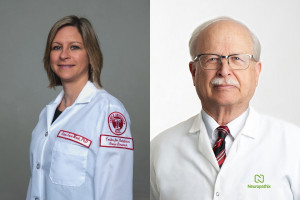Q&A: NeuroFlow and Genomind Team Up to Advance Mental Health Care
The two local companies are combining new tech and genetic testing to improve outcomes for patients.

Chief executive officer at Genomind Inc., Shawn Patrick O’Brien, and chief executive officer and co-founder of NeuroFlow, Chris Molaro.
Genomind, a King of Prussia-based mental health company, and NeuroFlow, a Philadelphia-based health care analytics and technology company, recently announced an agreement to partner their proprietary technology and clinical services to improve patient care across a broad spectrum of mental health conditions.
Genomind offers a personalized genetic testing service that helps physicians determine which medications would be most effective in treating a patient’s mental health condition based on their unique genetic makeup, while NeuroFlow’s software and apps enable behavioral health specialists and psychologists to remotely monitor a patient’s mental wellness. The new partnership will give providers access to NeuroFlow’s mental health remote monitoring apps alongside Genomind’s Professional PGx Express genetic testing services, which combined, may enable physicians to better understand their patients’ genetics and how genetics may affect mental health, and to remotely track progress along the entire patient journey.
NextHealth PHL spoke with NeuroFlow chief executive officer and co-founder Chris Molaro and Genomind chief executive officer Shawn Patrick O’Brien to learn more about the new partnership and how the companies’ services could make mental health care more personalized.
NextHealth PHL: Why is this partnership so important at this particular time?
O’Brien: Mental health affects all of us. I wanted to take the opportunity to move precision medicine forward in mental health. Having worked in oncology and being experienced in personalized medicine, I know oncology is roughly ten years ahead of where we are today in mental health. In the next decade, depression is about to be the leading healthcare cost to the system according to the CDC. But if you look at all the investment dollars from venture capitalists going into drug development, it has primarily been to oncology over the last 15 years.
We’ve made great strides for everybody in oncology with precision medicine, but decisions and strategies of the big pharma market over the last ten years have really affected the ability to bring new medicines, therapies and knowledge into mental health. That’s what we’re working together to change. When we both talked about why we’re in mental health, we both realized we had a similar vision: to remove the stigma associated with mental health and to provide better outcomes for patients. We have a lot of cultural and mission-driven overlap, which is why it made perfect sense for us to work together.
Molaro: We are two companies that are focused on providing better mental health care and data-driven healthcare, and we’re both in the Pennsylvania region. I’m surprised we did not find each other and try to work together sooner.
What does each company bring to the table?
Molaro: The value that Genomind brings is that they allow a more personalized approach to treating mental health disease, specifically regarding medication management. The other proposition that we bring is we enable the providers to conduct measurement-based care and to remotely monitor patients so they can treat the patient more holistically. We also have engagement tools for the patients that are all based on clinical guidelines and best practices, which provides that extra level of support to patients when they need it the most. Marrying those two together was important. We didn’t have the genetic data points in our system. Likewise, Genomind didn’t have a system to engage their patients once they had their genetic makeup. Together, we should see improved access to mental health care and engagement with that care in a more precise manner.
From a data analytics perspective, we don’t sell patient data. Everything is HIPAA compliant, but the data piece is extremely important. What Genomind does is give us a crucial element in that data piece that we didn’t have before.
O’Brien: We have a distribution and physician influence that’s much bigger than they have, and they have a technology platform that is unique and can dovetail nicely into our product offering on pharmacogenetics. So, for us, it’s the perfect opportunity to partner with them and to deliver on our mutual need to add value to all of our customers.
How will this work for providers?
Molaro: A provider that is already using Genomind’s PGX will be able to opt in to using NeuroFlow, and our implementation team will make sure that they’re trained. For providers who are already using NeuroFlow, they’ll have an option to opt in to using Genomind’s PGX.
One of the things to hang our hat on are our engagement numbers. Of all of the patients that are on the NeuroFlow app and platform, about 75 percent of them will be engaged in, on average, 20 activities on the platform in their first month. That is far and above better than any other digital health apps out there in the market. And one of the reasons for that is we’ve taken an approach to empathize with the patient and to use certain techniques to drive that engagement. We’ve used data analytics to make sure that they’re having a better experience over time.
What will be the long-term impact of this partnership on mental health care?
Molaro: More than 40 million Americans have a behavioral health issue. Roughly two thirds of them will never get behavioral health specialty treatment. About five to ten years from now, with access to our tools and precision medicine capabilities, we should have all Americans that need help have access to that help through these means. And as for the other 250 plus million Americans who don’t have a behavioral health diagnosis but are at risk for that, we can be a resource to them as well in a proactive sense.
O’Brien: I know patients are going to adhere better to medications and therapies, and we’re going to see higher productivity in those people. This partnership is also going to help us collect data for the long term to help companies develop new drugs and therapies based on outcomes data and genetic data combined with behavioral health data. And we have to reduce the stigma associated with mental health. We hope this is a long-term partnership, and the biggest benefit is going to be for our patients.


